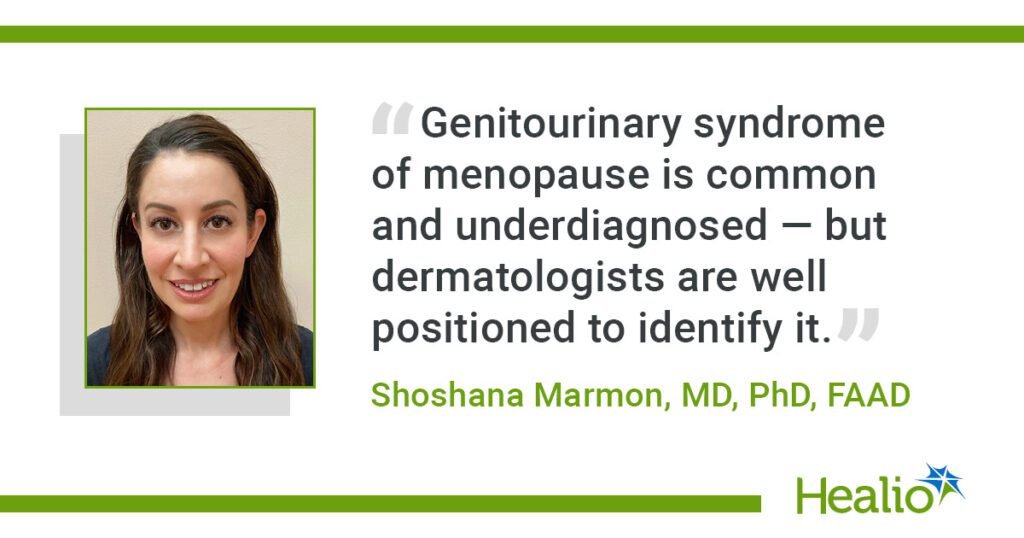Understanding Genitourinary Syndrome of Menopause: A Dermatology Perspective
Key Takeaways
- Genitourinary syndrome of menopause (GSM) is prevalent yet frequently overlooked in dermatology.
- Low-dose vaginal estrogen is a safe and effective treatment for vaginal atrophy symptoms, including itchiness.
- Many patients are reluctant to discuss their symptoms, while clinicians might not be fully aware of effective treatment options.
What is Genitourinary Syndrome of Menopause (GSM)?
Genitourinary syndrome of menopause, previously known as vulvovaginal atrophy, affects up to 84% of postmenopausal women. Common symptoms include:
- Dryness
- Burning
- Itching
- Pain during intercourse (dyspareunia)
- Recurrent urinary tract infections (UTIs)
Untreated, these symptoms can significantly impair the quality of life. Yet, many women hesitate to voice their concerns to healthcare providers.
The Role of Dermatologists in Managing GSM
Dermatologists are uniquely qualified to address vulvovaginal disorders, including GSM. This is especially true because they often encounter overlapping conditions such as:
- Lichen sclerosus
- Lichen planus
- Lichen simplex chronicus
These conditions present symptoms that coincide with GSM, creating an opportunity for dermatologists to identify and treat these disorders effectively.
The Importance of Awareness
Shoshana Marmon, MD, PhD, emphasizes that dermatologists should actively recognize and diagnose GSM. Increased familiarity with GSM can help professionals feel more confident in discussing it with patients, thereby reducing the stigma associated with these intimate problems.
Effective Treatment Options for GSM
First-Line Treatments
- Vaginal moisturizers and lubricants are typically the initial treatment recommendation for mild symptoms. However, they often provide only temporary relief for moderate to severe cases.
Low-Dose Vaginal Estrogen
- The gold-standard treatment for GSM is low-dose vaginal estrogen. Available in various forms, including creams, tablets, rings, and inserts, these formulations are supported by extensive clinical research indicating their safety and efficacy for managing GSM symptoms.
Other non-estrogen alternatives are also available, such as vaginal dehydroepiandrosterone and oral ospemifene.
Addressing Concerns About Vaginal Estrogen
Despite its effectiveness, there remains some hesitation among patients and clinicians regarding the use of vaginal estrogen. A key concern stems from the FDA’s black box warning, which can lead to misunderstandings about the safety of localized hormonal treatments compared to systemic therapies.
Dr. Marmon notes that low-dose vaginal estrogen, when properly administered, results in minimal systemic absorption. Recent studies, including a 2024 meta-analysis, have shown that vaginal estrogen poses no increased risk for recurrence of breast cancer, even in high-risk populations.
Coordination with Other Healthcare Providers
Consultation with gynecology or oncology can be beneficial for patients with a history of hormone-sensitive cancers. This collaboration helps to ensure comprehensive care, allowing dermatologists to confidently prescribe vaginal estrogen therapies.
The Need for Education and Training
The lack of sufficient training in menopause-related topics is a significant issue in the medical community. As GSM is common and often underrecognized, there is an urgent need for dermatologists to take a proactive role in diagnosing and treating these conditions.
Key Take-Home Messages
- Menopause is universal: All clinicians should have a foundational understanding of its effects.
- GSM is prevalent but often overlooked: Dermatologists already handle conditions with similar symptoms, making them well-suited to manage GSM.
- Low-dose vaginal estrogen is safe and effective: This treatment should not be sidelined, especially given the compelling evidence supporting its use.
By embracing their role in addressing GSM, dermatologists can significantly improve the quality of life for menopausal patients.
Conclusion
Genitourinary syndrome of menopause is a vital area of focus for dermatologists. Through increased awareness and effective treatment options like low-dose vaginal estrogen, clinicians can provide essential care that enhances the well-being of their patients.
References for Further Reading
- Menopause and Women’s Health in Dermatology
- Genitourinary Syndrome of Menopause: Management and Treatment
For additional insights, contact your healthcare provider or visit trusted medical resources.


